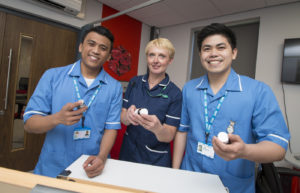Karen Mechen is employed as the Clinical Nurse Educator Team Manager at Hull University Teaching Hospitals NHS Trust with responsibility for training provision for internationally educated nurses (IENs). She has recently completed a research dissertation for an MSc in Health Studies (Hull University) which focused on the preparedness of migrating IENs to work in the UK and the NHS.

The NHS is facing a staffing crisis amongst all clinical healthcare professionals; with estimated registered nurse vacancies in excess of 41,0001. To help fill these vacant posts, many healthcare organisations are recruiting internationally educated nurses (IENs). An estimated 5,000 are IENs needed to improve staffing levels and provide a quality service2 and the number of IENs (including midwives) joining the NMC register currently stands at 2,824, and therefore falls short of this figure. The uncertainty created by Brexit is one factor that has affected the number of IENs registering with or leaving the NMC, with a decrease in the number of registrants from within the European Economic Area (EEA) from previous years. However, numbers of registrants from outside of the EEA has increased by 5.55% since 20183. The Covid-19 pandemic may also result in a reduction of available nurses due to depletion in the donor country’s workforce and economic damage caused by the pandemic and the imposed travel restrictions may result in migration being a less desirable option4.
To ensure the UK and NHS remain a desirable option, we must ensure that adequate support mechanisms are in place to ensure successful integration, patient safety and outcomes and a high retention rate. A well-documented cause of disharmony and decreased job satisfaction for IENs in the UK is the inability to practice the clinical skills they had previously been competent in, such as cannulation, intravenous medication administration or the insertion of naso-gastric tubes5. So, despite considerable expertise, when they first arrive in the UK they are reliant almost exclusively upon their colleagues and this leads to feelings of incompetence, a perceived lack of respect, fears of become deskilled and decreased job satisfaction6,7. NHS policy and practice reinforces the perception that newly registered IENs require the same support as UK trained new registrants, and so IENs are forced to revert from expert to novice8,9. In addition, the focus on a ‘one size fits all’ programme for IENs regardless of experience is ineffective. Inducting and supporting them using the same approach as newly registered nurses is creating stress, frustration and feelings of deskilling9.
This important issue has been recognised by the NMC in their recent ‘Principles for Preceptorship’10 which now includes guidance on the preceptorship process for nurses who originally trained outside of the UK. The guidance stipulates that any preceptorship programme should be designed to complement the knowledge, skills, attributes and competencies that the healthcare professional has already attained at the point of their registration. It is reassuring that the NMC have recognised the need to change the current guidance on IEN support and this does provide an opportunity for UK healthcare providers to also update and change their policy and practice. By acknowledging and valuing the expertise that IENs bring to UK healthcare, it is hoped that this will fundamentally alter the experiences of IENs, enhancing their integration and impacting retention.
References
- Buchan, J., Gerschlick, B., Charlesworth, A. & Seccombe, I. (2019) Falling short: The NHS workforce challenge: Workforce profile and trends of the NHS in England. Available online: https://www.health.org.uk/sites/default/files/upload/publications/2019/S05_Falling%20short_The%20NHS%20workforce%20challenge.pdf [Accessed 27/5/20].
- Health Foundation, (2019) Closing the gap: Key areas for action on the health and care workforce. Available online: https://www.health.org.uk/publications/reports/closing-the-gap [Accessed 27/5/20].
- NMC (2018) The NMC Register. Available online: https://www.nmc.org.uk/globalassets/sitedocuments/other-publications/the-nmc-register-2018.pdf [Accessed 26/5/20].
- ICN (2020) Covid-19 and international supply of nurses. Available online: https://www.icn.ch/system/files/documents/2020-07/COVID19_internationalsupplyofnurses_Report_FINAL.pdf [Accessed 7/8/20].
- Al‐Hamdan, Z. M., Al‐Nawafleh, A. H., Bawadi, H. A., James, V., Matiti, M. & Hagerty, B. M. (2015) Experiencing transformation: the case of Jordanian nurse immigrating to the UK. Journal of Clinical Nursing, 24, 2305-2313.
- Salami, B., Meherali, S. & Covell, C. L. (2018) Downward occupational mobility of baccalaureate‐prepared, internationally educated nurses to licensed practical nurses. International Nursing Review, 65(2), 173-181.
- Stievano, A., Olsen, D., Tolentino Diaz, Y., Sabatino, L. & Rocco, G. (2017) Indian nurses in Italy: A qualitative study of their professional and social integration. Journal of Clinical Nursing, 26(23-24), 4234-4245.
- Benner, P. E. (1984) From novice to expert: excellence and power in clinical nursing practice. California: Addison-Wesley.
- Bond S, Merriman C, Walthall H (2020) The experiences of international nurses and midwives transitioning to work in the UK: a qualitative synthesis of the literature from 2010 to 2019. Int J Nurs Stud ;110:103693. doi:10.1016/j.ijnurstu.2020.103693
- NMC (2020) Principles for Preceptorship. Available online: